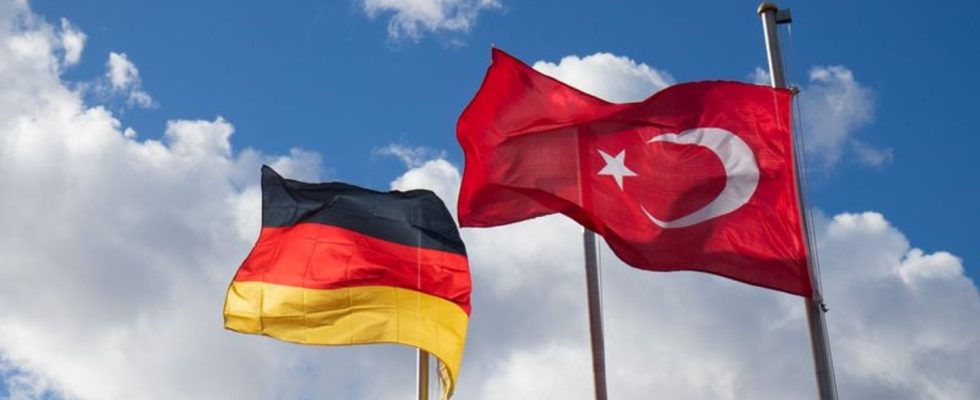diplomacy
Steinmeier in Turkey – visiting his difficult partner
Steinmeier’s visit to Turkey will be political with an important but difficult partner. Steinmeier comes just a few weeks after the local elections in Turkey. photo
© Christian Charisius/dpa
It has been ten years since a federal president visited Turkey. Now Frank-Walter Steinmeier is traveling to the Bosphorus. He doesn’t just want to look at official relationships.
They fetched coal from underground in Essen and assembled cars on the assembly line in Cologne – hundreds of thousands of Turks contributed to the German economic miracle from the 1960s onwards. The Federal President wants this achievement, which is often forgotten by Germans Frank-Walter Steinmeier during his three-day official visit to Turkey.
He will therefore begin it in Istanbul at the historic Sirkeci train station, from which many Turks began their journey to an uncertain future in Germany. Politically, it will be a visit to an important but difficult partner. Steinmeier comes just a few weeks after local elections in Turkey, whose significance went beyond the local.
Voters gave Turkish President Recep Tayyip Erdogan a lesson at the end of March. For the first time in its history, his Islamic conservative AKP was no longer the strongest force in the country. Instead, the country’s largest opposition party, the CHP, triumphed.
Capital Ankara and hosts only on Wednesday
Immediately after his arrival, the Federal President will meet the re-elected Mayor of Istanbul Ekrem Imamoglu. Erdogan’s adversary is considered a future presidential candidate. Imamoglu previously described German-Turkish relations as something very special.
The visit has, so to speak, an upside down program. Normally, the Federal President flies to the capital of the respective country, is greeted with military honors by the host, then retreats to talk and later meets again for an official meal. And only then do other stations in the host country join in. The situation is the other way around on the trip to Turkey: the capital Ankara and host Erdogan will only arrive at the end of the visit on Wednesday.
By first meeting Imamoglu, Steinmeier is sending the signal – whether targeted or not – that Berlin is already looking to the post-Erdogan period. It is fitting that a conversation with the leader of the opposition CHP party, Özgür Özel, is also planned.
Not just a pleasant topic of conversation
Steinmeier and Erdogan will be together for around three hours. Unpleasant topics are also likely to come up. Important representatives of civil society such as cultural promoter Osman Kavala are still in prison. The organization Reporters Without Borders appealed to Steinmeier to push for the release of imprisoned media workers.
The issue of the Gaza war will be a particular challenge, with Berlin and Ankara taking completely opposing positions. On the German side, Erdogan’s stance on the Islamist Hamas is causing irritation. The Palestinian organization is responsible for the October 7 massacre in Israel – but Erdogan calls it a liberation organization. He accuses Israeli Prime Minister Benjamin Netanyahu of a “massacre” in the Gaza Strip and sometimes compares him to Adolf Hitler. Immediately before Steinmeier’s arrival, Erdogan met with Hamas foreign chief Ismail Hanija at the weekend.
Over 3 million Germans of Turkish origin
In Berlin and Ankara, however, it is emphasized that Steinmeier and Erdogan know each other well. “My friendship with Steinmeier goes back years,” said Erdogan, referring to the visit. Both politicians can also speak to each other plainly.
And they have to talk to each other because the ties between the two countries are close. According to the Foreign Office, around 876,000 people from Turkey came to Germany after a recruitment agreement was concluded in 1961. Many stayed forever and brought their families with them. Today almost three million people with a Turkish migration background live in Germany.
The close connection also became clear after the severe earthquake in Turkey and Syria in February last year. According to official figures, more than 53,000 people died in Türkiye alone. At that time, the federal government promised both countries earthquake aid worth 238 million euros. In addition, more than 17,000 visas were issued for Turks affected by the earthquake in an accelerated and simplified process so that they could come to Germany temporarily or permanently as part of family reunification. A visit to the earthquake zone is also on Steinmeier’s travel program.

